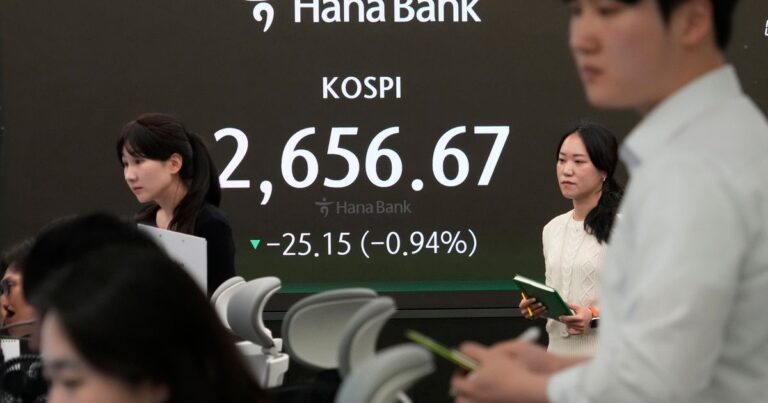HONG KONG (AP) – European markets opened higher on Monday, while concerns about a possible escalation of tensions in the Middle East spooked financial markets and prompted investors to look for safer places for their funds. Asian stocks fell.
The S&P 500 futures index rose 0.5%, and the Dow Jones Industrial Average futures index rose 0.4%.
Oil prices fell despite rising tensions in the Middle East region. The attack late Saturday marked the first time Iran has launched a military attack on Israel, despite decades of hostility between the two countries since the 1979 Islamic Revolution.
Benchmark U.S. crude oil fell 97 cents to $84.69 a barrel. Brent crude, the international standard crude oil, fell $1.22 to $89.23. Prices are being held down by slowing demand from China and forecasts that supply growth will outpace demand.
“While the drone attack has grabbed headlines, the immediate impact on global markets, particularly oil prices and inflation concerns, is likely to be muted,” Stephen Innes, managing partner at SPI Asset Management, said in a commentary. . “The precision and limited lethality of Iran's response suggests a strategic approach aimed at minimizing damage rather than escalating tensions.”
European markets were mostly higher in early trading, with Germany's DAX up 0.8% to 18,075.85. The Paris CAC40 index rose 0.6% to 8,060.14. In London, the FTSE 100 fell 0.5% to 7,959.92.
In Asian trading, Japan's benchmark Nikkei stock average fell 0.7% to 39,232.80 yen.
In currency trading, the U.S. dollar rose to 153.87 yen from 153.07 yen, another 34-year high, as investors moved to traditional havens amid uncertainty. The euro rose to $1.0659 from $1.0635.
Australia's S&P/ASX 200 fell 0.4% to 7,754.50 and South Korea's Kospi fell 0.4% to 2,670.43.
Hong Kong's Hang Seng fell 0.6% to 16,619.33. The Shanghai Composite rose 1.3% to 3,057.38 after the market regulator announced additional measures to support the financial sector.
Elsewhere in Asia, Taiwan's Tyex fell 1.4% and India's Sensex fell 0.8% as investors prepared for long national elections.
Wall Street stocks fell on Friday after a mixed start to earnings season.
The S&P 500 fell 1.5%, ending its worst week since October. The Dow Jones Industrial Average fell 1.2% from the previous day's record, and the Nasdaq Composite fell 1.6%.
A series of reports since the start of this year have shown that both inflation and the overall economy remain in worse shape than expected. That has forced traders to scale back their expectations for how many times the U.S. Federal Reserve may cut its key interest rates this year. Traders are primarily betting on just two rate cuts, down from at least six expected rate cuts at the start of the year, according to CME Group data.
Partly due to expectations for interest rate cuts, U.S. stock indexes were already breaking records. If interest rates are not eased, companies will need to generate higher profits to justify their stock prices, which critics say are too high by many measures.


